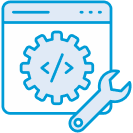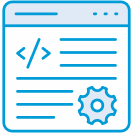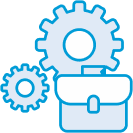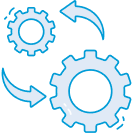
What is No-Code?
No-code development lets anyone create powerful apps without any coding. Platforms like Tadabase offer easy drag-and-drop tools, making app building quick and accessible. This approach speeds up development, cuts costs, and allows both tech and non-tech users to bring their ideas to life. Whether you're a business owner or a team member, no-code platforms help you innovate and adapt fast.
Why No-Code is the Future?
How No-Code Helps Your Business
Learn how no-code platforms can speed up development, inspire innovation, and bring business and IT together.

Digital Transformation
Accelerate your digital transformation by enabling rapid application development.

Drive Innovation
Empower employees to innovate and create solutions tailored to their specific needs.

Close the Technical Skill Gap
Enable non-technical users to build applications, reducing dependency on scarce developer resources.

Boost Company Culture
Promote a culture of continuous improvement and innovation.

Increase Efficiency
Streamline processes and reduce manual tasks, increasing overall efficiency.

Deliver Quick Wins Fast
Quickly implement and iterate on solutions to meet business needs.

Enable Quick Development
Reduce the time required to develop and deploy applications.

Empower Your Team
Give your team the tools to create solutions, fostering a culture of innovation.

Align Business and IT
Bridge the gap between business and IT by enabling collaboration on application development.

Modernize Legacy Systems
Quickly replace outdated systems with modern, scalable applications.
No-Code vs. Low-Code: What's the Difference
Understanding the differences between no-code and low-code platforms can help you choose
the right solution for your business needs. Here’s a quick comparison:
Features |
No Code |
Low Code |
|---|---|---|
|
Target Users |
Target Users Business users, non-developers |
Developers, IT professionals |
|
Development Speed |
Development Speed Fastest |
Fast |
|
Customization |
Customization Limited to platform capabilities |
Highly customizable |
|
Technical Skill Required |
Technical Skill Required None |
Basic to advanced coding skills |
|
Complexity Handling |
Complexity Handling Moderate |
High |
|
Flexibility |
Flexibility Moderate |
High |
|
Use Case |
Use Case Simple to moderately complex apps |
Complex enterprise applications |
|
Cost |
Cost Lower overall cost |
Higher initial and ongoing costs |
Choosing the Right Approach
When deciding between no-code, low-code, and traditional development methods,
consider the following:

Why use no-code when I can hire developers?
Shift your focus from managing legacy code to driving business agility and innovation.
Read the Blog PostThe Tadabase Approach to No-Code
At Tadabase, we believe in empowering users to build and manage their own applications with ease. Our platform combines the best of both worlds – the simplicity of no-code with the power and flexibility needed for complex business solutions.




What Can You Build with No-Code?
No-code platforms like Tadabase enable you to build a wide range of applications to meet various business needs. Here are some example applications and use cases:
Business Automation
-
Workflow Automation
Streamline and automate repetitive tasks, such as data entry and approval processes.
-
Task Management
Create custom task management systems to track and manage project tasks and deadlines.
-
Customer Relationship Management (CRM)
Develop CRM systems to manage customer interactions and data.
Learn More


Operations Management
-
Inventory Management
Build applications to track inventory levels, orders, and suppliers.
-
Employee Management
Create systems to manage employee information, schedules, and performance.
-
Asset Tracking
Develop applications to monitor and manage company assets.
Healthcare
-
Patient Management
Streamline patient data collection and management, appointment scheduling, and treatment tracking.
-
Telehealth Solutions
Create platforms for remote patient consultations and virtual care.
-
Health Record Systems
Develop secure electronic health record (EHR) systems.


Custom Solutions
-
Event Management
Plan and manage events, track attendees, and handle registrations.
-
E-commerce Platforms
E-commerce Platforms
-
Reporting and Analytics
Create custom dashboards and reports to analyze business performance.
Get Started with Tadabase Today
Whether you're a small business or an enterprise, our platform empowers you to create, innovate, and succeed.
By using Tadabase, you're not just keeping up with the times; you're leading the charge in the no-code revolution. Empower your team, accelerate development, and transform your business with Tadabase today.
Alternatives to No-Code Solutions
While no-code offers many benefits, it's important to consider all your options:
FAQs About No-Code Development
No-code development is a method of creating software applications without needing to code. It uses visual interfaces and pre-built components to streamline the development process.
No-code platforms are designed for everyone – from business owners and entrepreneurs to IT professionals and hobbyists. They are user-friendly and accessible, regardless of technical expertise.
No-code development refers to the creation of applications without writing traditional code. It uses visual interfaces and pre-built components to enable anyone to build software.
You can build a wide range of applications, including business process management tools, customer relationship management (CRM) systems, data dashboards, and more.
No-code development significantly speeds up the creation process, lowers development costs, and enables rapid prototyping and iteration. It also empowers non-technical team members to contribute directly to app development.
No-code platforms like Tadabase implement robust security measures, including data encryption, access controls, and regular updates, ensuring your applications are secure.
Absolutely. No-code platforms are built to scale, accommodating the growing needs of your business while allowing for continuous updates and enhancements.
No-code development is part of a larger trend towards democratizing technology, making it easier for people without technical backgrounds to create and innovate. It complements traditional coding by allowing rapid development and deployment.











